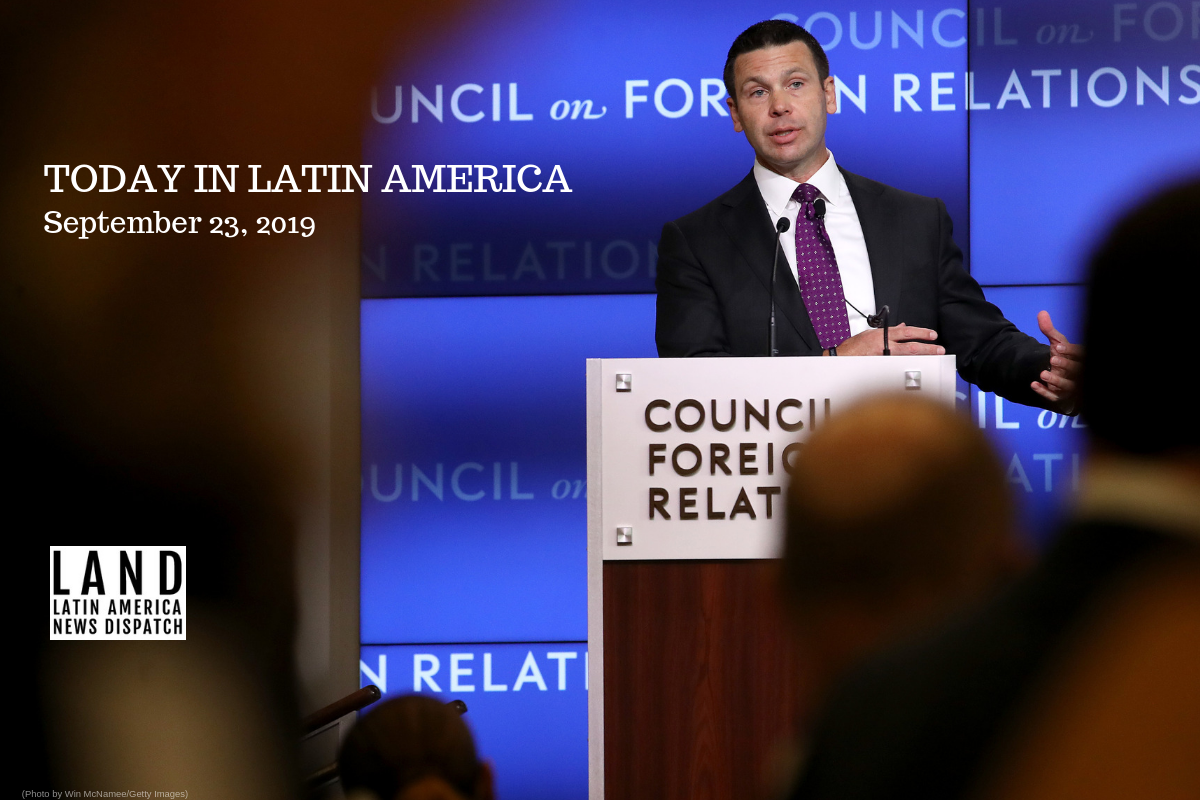

Acting U.S. Homeland Security Secretary Kevin McAleenan delivers remarks at the Council on Foreign Relations September 23, 2019 in Washington, DC. (Photo by Win McNamee/Getty Images)
HONDURAS: As the United States and Honduras work out the details of an immigration agreement, the countries are discussing how to increase temporary legal employment for Hondurans in the United States. Honduran President Juan Orlando Hernández and U.S. Homeland Security Secretary Kevin McAleenan conducted bilateral meetings this weekend, and plan to continue the negotiations in a second meeting next week. In a joint statement, the leaders said they are paying close attention to “each nations’ legal requirements while also advancing our mutual objectives.”
The agreements are part of a broader initiative between the United States and Central American countries to forge “safe third countries” to accept migrants trying to reach the United States. McAleenan has already negotiated an agreement with Guatemala and El Salvador. This weekend’s joint statement said the meetings “recognize Honduras’ progress in the areas of security and migration.”
HEADLINES FROM THE WESTERN HEMISPHERE
SOUTHERN CONE
ARGENTINA: Former President Cristina Fernández is set to face her second trial for bribery and corruption in federal court. Fernández was accused in 2018 of leading a widespread illegal bribe operation involving at least 53 other people, mainly former officials of her administration and executives from construction firms. The scandal was commonly referred to as the causa de los cuadernos, after a former government driver turned over eight notebooks, supposedly written over 10 years, describing delivering bribes to government contractors and officials.
THE ANDES
COLOMBIA: An attack on a Norte de Santander police station led to 16 injuries this weekend. According to local authorities, an explosive was thrown against the police station by two unknown men riding a motorcycle. Just a day earlier, another assault against a police station was registered in Corinto, a municipality in the Cuaca region. These attacks join a series of violent incidents that may be linked to the country’s upcoming elections and the rearmament of some FARC commanders.
VENEZUELA: Both Nicolás Maduro and Juan Guaidó will send delegations on behalf of Venezuela to the UN General Assembly this week. Opposition leader Juan Guaidó announced that he will be sending his foreign representative, Julio Borges, to “represent our government and all Venezuelans,” as well as increase pressure against Maduro’s administration. His delegation also includes his ambassador to the United States, the president of the Parliament Commission for Humanitarian Aid, and other “victims.” Maduro, in turn, said his delegation will denounce Guaidó’s alleged collaboration with Colombian drug trafficking organization “Los Rastrojos” and will deliver a petition against U.S. blockades signed by 13 million Venezuelans.
CENTRAL AMERICA
NICARAGUA: Nicaraguan police fired tear gas and rubber bullets at anti-government protesters in the capital Managua this weekend, injuring two people. Hundreds of demonstrators took to the streets on Saturday despite heavy police presence. The protesters demanded President Daniel Ortega stand down and called for an election. Unrest in Nicaragua began in 2018, and hundreds have been killed in government crackdowns.
THE CARIBBEAN
CUBA: Cuba will employ oxen to replace tractors to plough sugar cane fields due to the island’s acute fuel shortage amid United States sanctions. The government is also using wood instead of gas at many state bakeries and advising citizens to save electricity. It is prioritizing fuel to sustain critical services and sectors such as tourism, and seeking alternatives or scaling down in other areas. Cuban officials announced that U.S. sanctions on oil shipments to the island meant it had not secured enough fuel for this month.
NORTH AMERICA
UNITED STATES: The United States and El Salvador signed an asylum agreement on Friday, which would allow the United States to send asylum seekers to El Salvador. The details of the agreement, signed by El Salvador’s foreign minister, Alexandra Hill, and acting secretary of Homeland Security Kevin K. McAleenan, remain unclear. Human rights organizations say that sending asylum seekers to El Salvador or Guatemala, which signed a similar deal with U.S. officials, is illogical because both the two countries have high rates of violence.
MEXICO: Mexico’s Secretary of the Interior Olga Sánchez Cordero will make a public statement apologizing to Martha Alicia Camacho Loaiza, a victim of the country’s Dirty War. Mexican soldiers detained Camacho and her husband José Manuel Alapizco Lizárraga in Culiacán, Sinaloa in 1977. Both were members of the September 23 Communist League. Camacho was tortured and forced to give birth in captivity. Her husband was extrajudicially executed and his body was never found. Camacho said in an interview with Mexican newspaper El Universal that an apology is not enough, and that victims of state violence want “Memory, truth, justice, punishment for those responsible and measures that guarantee these acts will not be repeated.”
MEXICO: The Sub-Secretary of Health said this weekend that Mexico’s anti-obesity and anti-diabetes strategies under the Peña Nieto government were a failure. Peña Nieto spearheaded the National Crusade Against Hunger during his presidency. However, malnutrition, obesity and diabetes continue to be major health problems in Mexico. Sub-Secretary of Health Prevention and Advancement Hugo López-Gatell said the López Obrador administration will focus on clear labeling for food products and revise advertising laws.
GOT NEWS? Send the editors tips, articles and other items for inclusion in Today in Latin America to tips@latindispatch.com.
Subscribe to Today in Latin America by Email


